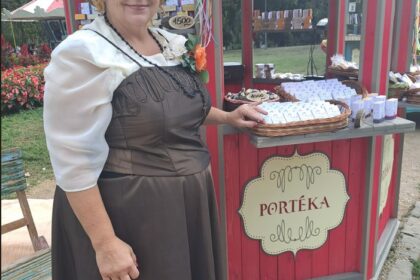
Monika Zsuzsanna Horváth, born in Oradea in 1971, has led a life defined by resilience, adaptability, and a strong sense of community. After moving to Hungary through marriage, she raised three sons, supported by her second husband, a livestock engineer. With a background in chemical technology and professional experience in the catering industry, Monika decided to redirect her life towards farming and rural development. Together with her husband, she settled in the small village of Szentistvánbaksa, where they began rearing goats. Initially, their focus lay on cheese production, yet Monika soon drew inspiration from her grandmother’s Transylvanian soap-making tradition. Using her own knowledge of chemistry, she transformed this heritage into a modern enterprise. Thus, in 2017, “Gidatitok” was born – a line of high-quality artisan goat milk soaps. What started under a public employment programme grew into a private enterprise, supported by a Budapest family business, and it quickly became a symbol of renewal for the village and its people.
Monika’s farm and manufactory have adopted an innovative approach that links animal husbandry, resource management, and sustainable product development. A key aspect of her model is the replacement of water with goat milk as the primary raw material in soap production. This method not only preserves water but also elevates the value of the final product. By contrast, cheese-making demands extensive water use at multiple stages, making soap a more resource-efficient alternative. Her commitment to sustainability extends further: goats are fed using local green waste from households and municipal services, reducing landfill pressure and improving soil quality through natural fertilisation. The cycle remains firmly rooted in the local ecosystem, as hay harvested from riverside meadows along the Hernád River provides fodder while helping maintain flood defences.
In production, water is used only sparingly for equipment cleaning, with careful measures in place to prevent unnecessary waste. The environmentally conscious ethos also shapes the broader farm activities, which integrate grazing, waste reduction, and natural soil enrichment. These decisions demonstrate Monika’s dedication to protecting local water resources, fostering biodiversity, and minimising ecological impact.
The results of this innovation are manifold and extend beyond environmental benefits. Economically, the enterprise contributes to the local tax base, supports municipal functions, and has invigorated tourism by linking soap-making with the Hernád River’s recreational opportunities. Property values in the village have risen, and new investments have been encouraged. Socially, the initiative is transformative: in a village of just 264 residents, Gidatitok now employs six individuals, offering meaningful work, stability, and renewed confidence to those involved. Many employees have overcome personal difficulties, rebuilt family ties, and regain a sense of purpose through their engagement with the manufactory. The project, once a modest local experiment, has grown into a recognised county treasure, listed in the County Value Registry and celebrated in national media.
Gidatitok exemplifies how a rural community can thrive when local traditions are combined with innovative, sustainable practices. It represents an approach that is both replicable and transferable, inspiring other villages to harness their unique resources. For Monika, the venture embodies more than business success: it is a testament to how collective will, respect for tradition, and a vision for sustainability can bring life back to even the smallest communities.





